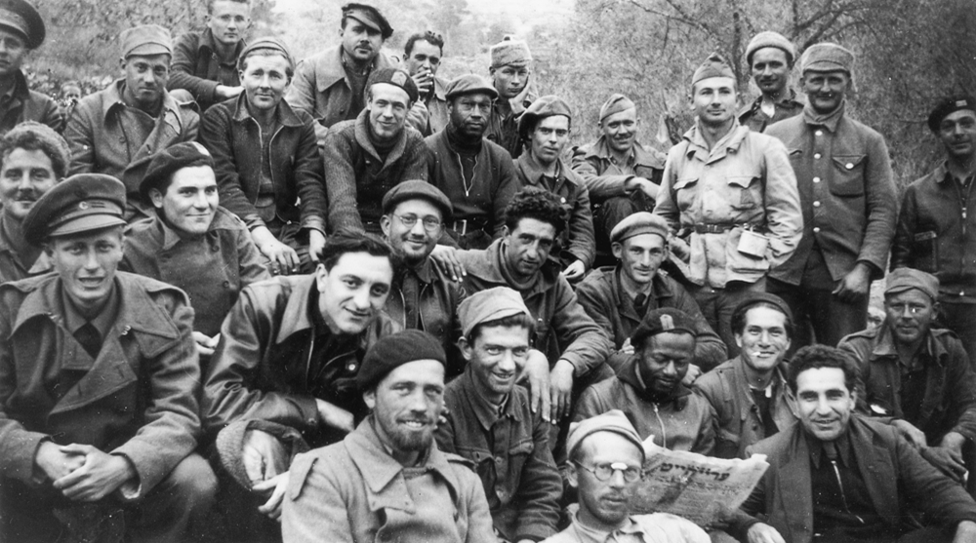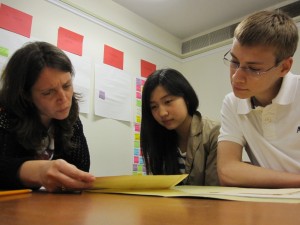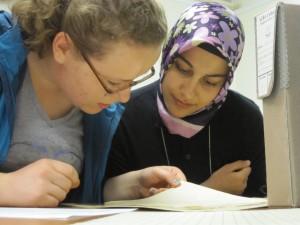Legible Legacies: A World without the Lincolns
The legacy of the Spanish Civil War played a crucial role in the lives of Lydia Cacho and Jeremy Scahill, the winners of the ALBA/Puffin Award. But how do we ensure its transmission to younger generations, whose life world is so different that they often have trouble even reading the Lincolns’ hand-written letters? ALBA’s James Fernández reflects on tangible and less tangible legacies. Will the vets’ spirit remain legible in a time that rewards calculating individualism over principled collective action?
 Over the last fifteen years or so, I have had the privilege of helping college and high school students work with materials from the Abraham Lincoln Brigade Archives (ALBA). The core of the ALBA collections are the personal papers of roughly three hundred of the 2,800 men and women who, between 1936 and 1938, volunteered to fight fascism in Spain. Recently, I have noticed an alarming trend; fewer and fewer young people are being taught how to read and write cursive handwriting. So even though the penmanship of many of the brigadistas is often remarkably neat and clear, as the years go by, I catch more and more of our students staring at manuscript letters as if they were so many indecipherable cryptograms.
Over the last fifteen years or so, I have had the privilege of helping college and high school students work with materials from the Abraham Lincoln Brigade Archives (ALBA). The core of the ALBA collections are the personal papers of roughly three hundred of the 2,800 men and women who, between 1936 and 1938, volunteered to fight fascism in Spain. Recently, I have noticed an alarming trend; fewer and fewer young people are being taught how to read and write cursive handwriting. So even though the penmanship of many of the brigadistas is often remarkably neat and clear, as the years go by, I catch more and more of our students staring at manuscript letters as if they were so many indecipherable cryptograms.
My mind turned to this question of legibility as I sat in the auditorium of the Japan Society, awaiting the start of the program of the 80th Annual Commemoration of the veterans of the Abraham Lincoln Brigade.
I catch more and more of our students staring at manuscript letters as if they were so many indecipherable cryptograms.
I was probably primed to think about this issue by the images of ALBA’s educational outreach initiatives that were flashing on the auditorium screen while the sold-out audience filed in and found seats. In any event, because this was to be the first reunion to take place after the death of the last known surviving veteran, Del Berg, the question of the transmission of legacies—the challenge of how to keep a legacy legible—was probably on a lot of people’s minds that day. After all, the moment which for years we have both dreaded and prepared for—the post-veteran era—was finally here.
Tangible Legacies
The program at the 80th Reunion made it quite clear that the tangible, material legacy of the Lincoln volunteers is in good shape and in good hands. Thanks to the foresight of the volunteers themselves who established the archives back in 1979, and to the generosity of their family members who have been steadily donating valuable material to the collections ever since; thanks to the work of Director Tim Johnson and his staff at NYU’s Tamiment Library, the availability, relevance and longevity of the archives of the volunteers are secure for the foreseeable future. And the event also demonstrated at every turn that ALBA, the organization, has grown into a vibrant and efficient non-profit, just as we had always hoped for, ready to identify the opportunities and meet the challenges of this post-veteran era.
Invisible Legacies
The highlight of the program was the awarding of the ALBA-Puffin Prize for Human Rights Activism. This $100,000 prize, bestowed each year at the May event, aims to honor the memory of the Lincoln vets as international human rights activists in their own right. And for that reason, past awardees have been leaders in human rights struggles not only in Spain, but throughout the world. This year, the award was given to two fearless investigative journalists, Lydia Cacho of Mexico and Jeremy Scahill, of the US, neither of whom has any obvious connection to the Spanish Civil War.

Prof. Gabriela Calandra with two students from Bergen Academies, New Jersey, working with the ALBA collection at Tamiment Library, New York University. Photo Juan Salas.
That is why it was all the more striking to learn, during the course of the reunion program, that, unbeknownst to the prize selection committee, the legacy of the Spanish Civil War had actually played a crucial role in the political, professional and personal development of both awardees. Lydia Cacho told us how she had been educated at the Colegio Madrid in Mexico City, a school founded in 1941 by the Spanish Republican Government in exile! If there ever was a place on the planet where the values of the Second Spanish Republic lived on beyond 1939—the values which the Lincolns had risked their lives to defend—that place would have been, and continues to be, the classrooms of the Colegio Madrid. And it was in those very classrooms, Cacho told us, that her political conscious and her sense of justice were kindled. And the other awardee, Jeremy Scahill, told a remarkable story—also unknown to the award selection committee—of how, as a college student in Wisconsin, he once tried to establish an anti-racist and anti-fascist student group. He and his mates received invaluable moral and financial support from a mysterious elderly man, who eventually would become a long-term mentor and example to Scahill: the Lincoln veteran Clarence Kailin.
Intangible legacies
As I smiled and laughed and cried through the varied program of songs, projections and speeches at the 80th reunion, as I listened to Cacho and Scahill and marveled at how the antifascist legacy of the Spanish Civil War survives in inscrutable ways that can still surprise us, my mind kept circling back to that question of legibility. Not just to those students who can’t always make out the vets’ script; that kind of illegibility is certainly a handicap, but it can be overcome with a few lessons and lots of practice. We can take care of the letter of the vets’ legacy, of that I am confident. But will their spirit remain legible, now that they are no longer with us?
Today, two central traits of the Lincolns’ legacy are systematically denigrated.
Through the years, just as I’ve noticed the effects of the elimination of cursive from the elementary school curriculum, so too have I observed the effects of other “a,b,c” things dropping out of our general, shared culture and perhaps even out of our basic moral and political vocabulary. Two traits in particular, that are central to understanding the activist legacy of the vets, seem to becoming less and less intelligible to the younger generations; indeed, the two traits I have in mind are so systematically denigrated nowadays, that many young people probably see them primarily as flaws.

Two students from Bergen Academies, New Jersey, working with the ALBA collection at Tamiment Library, New York University. Photo Juan Salas.
The band’s rousing rendition of “No pasarán” at the annual event perfectly evoked the first of these qualities: selective intransigence. For the vets there were always certain basic issues on which there simply could be no transaction, no compromise. And just as I can still hear echoes of their intransigent voices belting out “¡No pasarán!” so too can I can hear them saying “We don’t care what it does to the bottom line, we are not going to send printing work to a non-union shop.” End of story. No extemporizing. No slippery slopes. For many of the volunteers, in certain contexts, “uncompromising” could only be a positive adjective. Not so for many of our students, and for many of us, though, who are so thoroughly schooled in the arts of “pragmatism” and of always trying to “meet halfway” or to “split the difference.” And in the meantime, unmoored on the tide of compromise, we drift.
And it was the singing of the “International” by several hundred people on their feet at the annual event that for me brought into sharp focus the second constitutive trait of so many volunteers: their steadfast belief in the efficacy of selfless, collective action. Without a solid appreciation of what collective action meant for the vets’ generation, their deeds and their legacy will remain largely incomprehensible—and inoperative. And yet our students—and perhaps we ourselves—have been so thoroughly schooled in the doctrines of meritocracy, of individual achievement honed by competition, we are often remarkably quick to see any form of collective action as a misguided abdication of the sacred autonomy of the sovereign “I”. And in the meantime, the pronoun “we” fades from our vocabulary.
Still aglow in the warmth generated by the reunion program, we filed out of the auditorium and back into a cold stark reality where fascism, or something eerily like it, seems once again to be in play as it was in the thirties. Where many of us seem to feel adrift, and unable to speak with conviction in the first person plural. And there it dawned on me: Keeping the legacy of the Lincolns both legible and accessible is not just some kind of exercise in nostalgia or paleography; it could well be a matter of survival.
James D. Fernández teaches at New York University and is author, with Luis Argeo, of Invisible Immigrants.















[…] allá de las definiciones de diccionario, resulta más productivo poner a los alumnos en contacto directo con las percepciones, análisis y experiencias de las y los que vivieron el auge del fascismo de primera mano y se levantaron contra él. Los […]
[…] allá de las definiciones de diccionario, resulta más productivo poner a los alumnos en contacto directo con las percepciones, análisis y experiencias de las y los que vivieron el auge del fascismo de primera mano y se levantaron contra él. Los […]